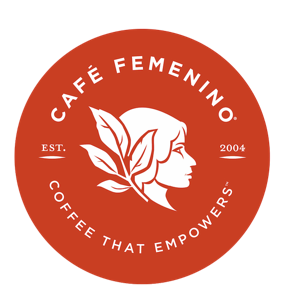
Café Femenino: Using Coffee To Pave The Road to Women’s Empowerment
Share
Café Femenino is an organization dedicated to creating a better, more sustainable future starting with coffee production. They achieve this through continuous support and encouragement to small producers—farmers with lands smaller than 2 hectares (or 5 acres) that have been in their families for generations. Why? Because we all come from farmers.
Although formally established in 2004 and reaching countries all over the world, Café Femenino began in the early 90s in the Peruvian countryside by Isabel and her husband Victor. Both studied sociology and shared a passion for their community and a desire to generate long-term, meaningful change. So, they went to rural communities in the country, starting in Cajamarca, and learned of the circumstances of coffee producers.
Given Peru’s climate and elevation, many farmers produced coffee. In the early 90s, coffee was already a staple in kitchens across the world. Up until recently, Latin American countries consumed mainly instant coffee, so these farmers needed to reach markets further away, like the US and Europe. However, these small farms did not produce enough to compete in the international market nor to supplement the costs of production. Since they could not produce more than they already did and they had no way of expanding their farms, Isabel and Victor found a different way to increase their income: certifications.
In their early years, the Café Femenino organization helped small producers gain their Fair Trade Organic certifications, which had them implementing organic farming, ethical labor, and trade practices with exporters, while increasing the value of the coffee they were already producing and selling. In other words, their one kilo of coffee was now much more valuable than it was before.
Certifications are more than seals on a bag, they’re protections for consumers and producers. With certifications, consumers trust that the coffee they’re buying is of the highest quality, while producers are guaranteed fair prices for the coffee they’ve worked so hard to grow and harvest, regardless of the state of the market.
Today, Café Femenino helps farmers attain Smithsonian Bird Friendly and Regenerative Organic certifications.
But Café Femenino doesn’t just focus on helping farmers, they emphasize women’s empowerment first and foremost. Women are just as part of coffee production as men are, they just don’t get the credit. Not only do they carry the responsibilities of domestic labor, but many have lost ownership of agricultural lands through outdated inheritance rules. Café Femenino helps them navigate the legal system to regain ownership and get a seat at the table when it comes to the coffee industry.
From the drive to help the community came the Café Femenino Foundation, an independent nonprofit, which helps the organization thrive while contributing directly to the local farming community. The foundation uses funds (from donations, mainly) to invest directly into the people in these farming communities. One of the ways it does so is through schools directed to farmers, where they learn of new discoveries and techniques in the industry and what new certifications are available to them. This not only helps them as farmers, but it gives them motivation and encouragement to stay in these communities. Rather than outgrow their farms and leave for cities in search of new, different opportunities, as past generations have, they grow alongside their communities, bringing about the opportunities for betterment and implementing them in their farms.
The foundation also brings resources to the communities, such as health programs for early uterine and breast cancer detection and leadership programs, aimed at the empowerment of both women and men.
Including men in women’s empowerment is key for long-term, positive effects. As founder, Isabel, describes, “Women cannot solve the [gender inequality] problem if men don’t understand.” For anything meaningful to be achieved, every group and need must be taken into account, which is why the programs the foundation leads are necessary and important for the success of the organization as a whole.
For farmers to be part of the Café Femenino organization, they must have certain protections and benefits for their women workers, whether it’s leadership roles, land ownership, or simply fair wages. Being part of this organization helps small farmers thrive in the international coffee industry, and the requirements ensure that Café Femenino’s mission and values are being applied world-wide.
An important facet of Café Femenino, and one of the keys to its longstanding success, is the relationships it creates, not just with farmers, but with roasters and importers. US roasters like Kaladi Coffee and Ampersand Coffee Roasters have had a strong relationship with the organization for more than 10 years. Collaborating with Organic Products Trading Company (OPTCO) and CECANOR, a coffee cooperative made up of women farmers in Peru, has allowed for Café Femenino to expand to other countries, such as Bolivia and Colombia, and even to other continents like Asia and Africa, furthering its impact.
Today, over 50% of the CECANOR Association is made up of women, in leadership positions and as farm owners. While the changes brought about by the organization and the foundation are tangible and significant, the work doesn’t end there. The world and society change every day, and keeping up with it means adapting and continuously acting, fighting for rights and equality.
Written by Mariana Bastías
